How big does your quantum computer need to be?
Wednesday, 02 February 2022 04:55 Quantum computers are expected to be disruptive and potentially impact many industry sectors. So researchers in the United Kingdom and the Netherlands decided to explore two very different quantum problems: breaking the encryption of Bitcoin (a digital currency) and simulating the molecule responsible for biological nitrogen fixation.
In AVS Quantum Science, from AIP Publishing, the resear
Quantum computers are expected to be disruptive and potentially impact many industry sectors. So researchers in the United Kingdom and the Netherlands decided to explore two very different quantum problems: breaking the encryption of Bitcoin (a digital currency) and simulating the molecule responsible for biological nitrogen fixation.
In AVS Quantum Science, from AIP Publishing, the resear China launches L-SAR 01A satellite for land observing
Wednesday, 02 February 2022 04:55 China launched a Long March-4C rocket to place a new satellite in space Wednesday.
The rocket blasted off at 7:44 a.m. (Beijing Time) at the Jiuquan Satellite Launch Center in northwest China and soon sent the L-SAR 01A satellite into preset orbit.
The satellite, equipped with L-band synthetic aperture radar (SAR), will be used to monitor the geological environment, landslides and ea
China launched a Long March-4C rocket to place a new satellite in space Wednesday.
The rocket blasted off at 7:44 a.m. (Beijing Time) at the Jiuquan Satellite Launch Center in northwest China and soon sent the L-SAR 01A satellite into preset orbit.
The satellite, equipped with L-band synthetic aperture radar (SAR), will be used to monitor the geological environment, landslides and ea Lion will roam above the planet - KP Labs to release their "king of orbit"
Wednesday, 02 February 2022 04:55 KP Labs is beginning to work on an expansion of its product portfolio with an on-board computer for small satellites that will streamline and speed up on-orbit data processing, as well as ensure greater hardware reliability in modern satellite missions. This is the third Data Processing Unit (DPU) designed by KP Labs, and the first one suited for use in larger missions. After the introduction of
KP Labs is beginning to work on an expansion of its product portfolio with an on-board computer for small satellites that will streamline and speed up on-orbit data processing, as well as ensure greater hardware reliability in modern satellite missions. This is the third Data Processing Unit (DPU) designed by KP Labs, and the first one suited for use in larger missions. After the introduction of Astra finalizes plans for first Florida launch
Tuesday, 01 February 2022 19:42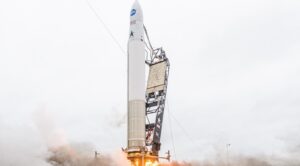
Astra Space will launch four NASA-sponsored cubesats on its Rocket 3.3 vehicle as soon as Feb. 5 on a mission that will be the first to use a streamlined set of commercial launch regulations.
U.S. Air Force to fund demonstrations of space internet services that integrate multiple constellations
Tuesday, 01 February 2022 18:47
The U.S. Air Force will fund demonstrations of space internet services where military aircraft, ships or ground vehicles can access broadband services from commercial constellations in different orbits.
The post U.S.
Solar panel startup mPower Technology secures funds for mass production
Tuesday, 01 February 2022 17:37
Startup mPower Technology said Feb. 1 it has raised $10 million to accelerate production of silicon-based solar panels that gained flight heritage last summer.
The post Solar panel startup mPower Technology secures funds for mass production appeared first on SpaceNews.
U.K. announces $2 billion in new funding for military space programs
Tuesday, 01 February 2022 15:57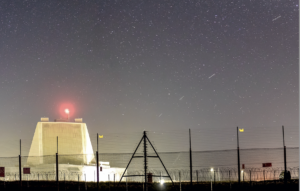
The United Kingdom's new space strategy released Feb. 1 emphasizes the role of the private space industry in developing capabilities for the military and fueling economic growth
The post U.K. announces $2 billion in new funding for military space programs appeared first on SpaceNews.
Newly discovered asteroid just second of its kind
Tuesday, 01 February 2022 15:00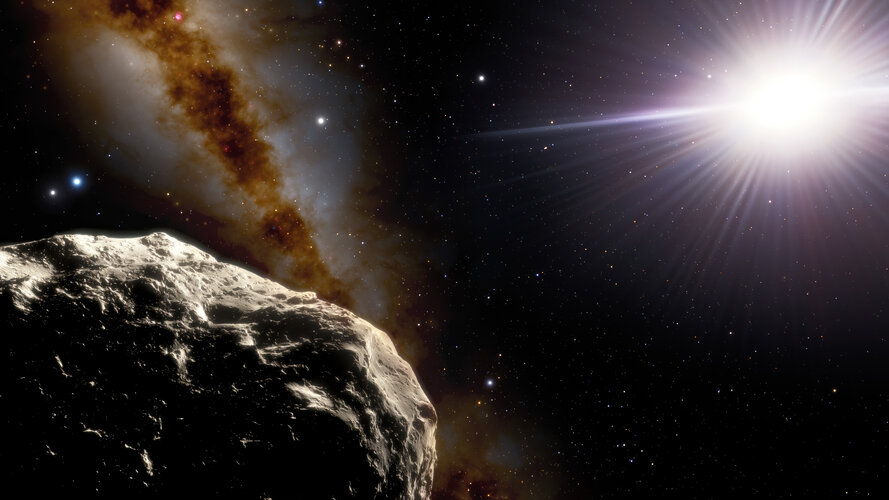
You may have heard of the Trojans, two vast swarms of asteroids that lead and trail Jupiter on its orbit around the Sun.
But the king of the planets doesn’t hold a monopoly on Trojan asteroids. The physics that gives rise to the formation of these distinctive collections of ancient rocks is the same for all planets – including Earth.
While the existence of Earth Trojans had been theorised for many years, the first direct observation of one was confirmed just over a decade ago. Since then, no second Earth Trojan
Telesat Lightspeed aiming to break ground early next year
Tuesday, 01 February 2022 13:22Landing stations that can connect to Telesat’s planned low Earth orbit broadband network will start being built in spring 2023, according to an executive for the Canadian satellite operator.
The post Telesat Lightspeed aiming to break ground early next year appeared first on SpaceNews.
In simulated mission, astronauts obtained direct haptic feedback from robots they control on the ground
Tuesday, 01 February 2022 13:14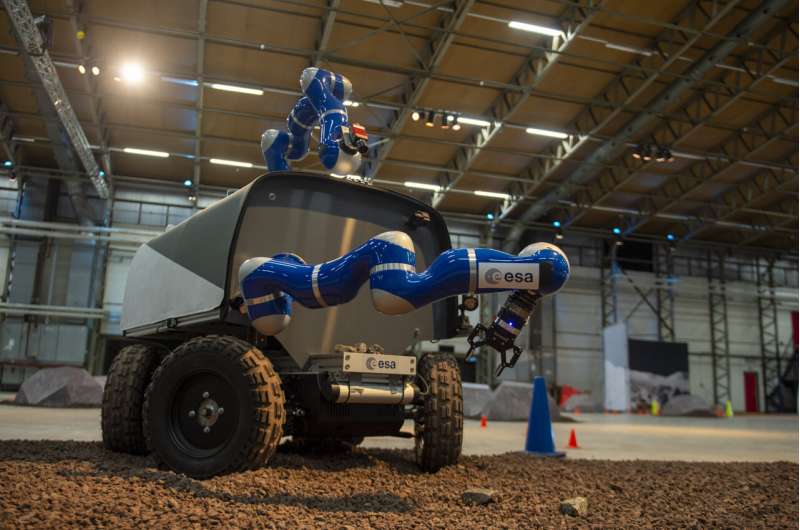
Astronauts in orbit could soon be using robots to explore lunar or planetary surfaces without having to expose themselves to the dangers of the extraterrestrial environment. A paper by Kjetil Wormnes and his colleagues based at the European Space Agency (ESA), Noordwijk, The Netherlands, published in the De Gruyter journal Open Astronomy, presents a simulated geological exploration mission in which, for the first time,astronauts in the International Space Station obtained direct haptic feedback from robots that they control on the ground, "feeling" objects that they manipulate.
Human interplanetary exploration is inspirational but it is still, largely, the stuff of science fiction; it is almost 50 years since somebody last set foot on the moon, and crewed expeditions beyond our satellite are still decades away.
During the last half-century, however, many missions have taken robots to planetary surfaces, and they can operate in conditions that are far too hostile for human astronauts, but they need direct human control if they are to undertake complex missions.
Apply now for the 2022 YGT opportunities!
Tuesday, 01 February 2022 13:00
The 2022 ESA YGT opportunities are now open for applications. Positions are available in engineering, science, IT and business services. Find out more and apply now.
Looking four-ward to launch
Tuesday, 01 February 2022 12:21 Image:
Image:
ESA astronaut Samantha Cristoforetti is all smiles alongside her Crew-4 mates during a training session at SpaceX headquarters in Hawthorne, California, USA.
Samantha is the next ESA astronaut to fly to space and is expected to be launched to the International Space Station in spring 2022. This is the second mission for Samantha who spent approximately 200 days in space in 2015 for her Futura mission.
Samantha is launching with familiar faces. Fellow mission specialist Jessica Watkins was part of NASA’s NEEMO 23 crew, in which Samantha served as commander. The team spent 10 days living and working
Relativity and SpaceX bid on NASA commercial space station competition
Tuesday, 01 February 2022 11:30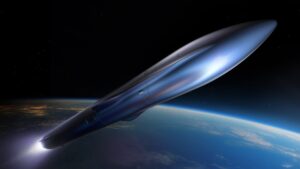
Launch companies Relativity Space and SpaceX were among the companies that submitted proposals last year to NASA for initial development of commercial space stations.
The post Relativity and SpaceX bid on NASA commercial space station competition appeared first on SpaceNews.
In space race, Europe faces choice: passenger or pilot
Tuesday, 01 February 2022 10:54 As the race to send people to the Moon and beyond heats up, Europe faces calls to make a choice: Keep paying for seats on spacecraft or finally fly its own manned vehicle.
Imagine if Christopher Columbus did not have a ship to sail to the Americas, the head of the European Space Agency said recently, lamenting that the continent lacked a vessel to "explore the next frontier".
"We wil
As the race to send people to the Moon and beyond heats up, Europe faces calls to make a choice: Keep paying for seats on spacecraft or finally fly its own manned vehicle.
Imagine if Christopher Columbus did not have a ship to sail to the Americas, the head of the European Space Agency said recently, lamenting that the continent lacked a vessel to "explore the next frontier".
"We wil Kendall Outlines 'Operational Imperatives,' Choices During Think Tank Appearance
Tuesday, 01 February 2022 10:54 While the United States military remains "the best in the world," Department of the Air Force Secretary Frank Kendall said Jan. 19 that the Air and Space Forces must move quickly to adapt and modernize to offset actions by China and others that have dented the "presumption of superiority" held by the U.S.
Kendall offered the assessment during a 45-minute "virtual fireside chat" sponsored b
While the United States military remains "the best in the world," Department of the Air Force Secretary Frank Kendall said Jan. 19 that the Air and Space Forces must move quickly to adapt and modernize to offset actions by China and others that have dented the "presumption of superiority" held by the U.S.
Kendall offered the assessment during a 45-minute "virtual fireside chat" sponsored b 